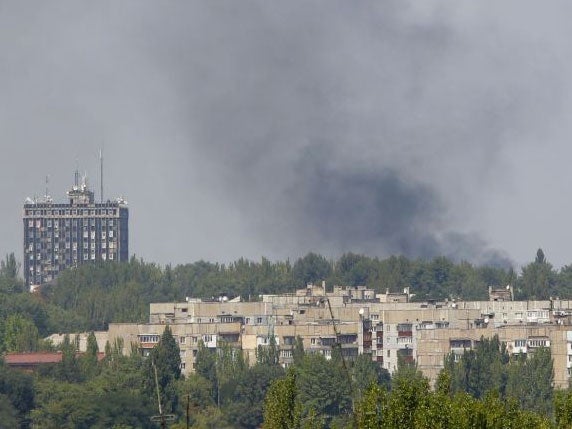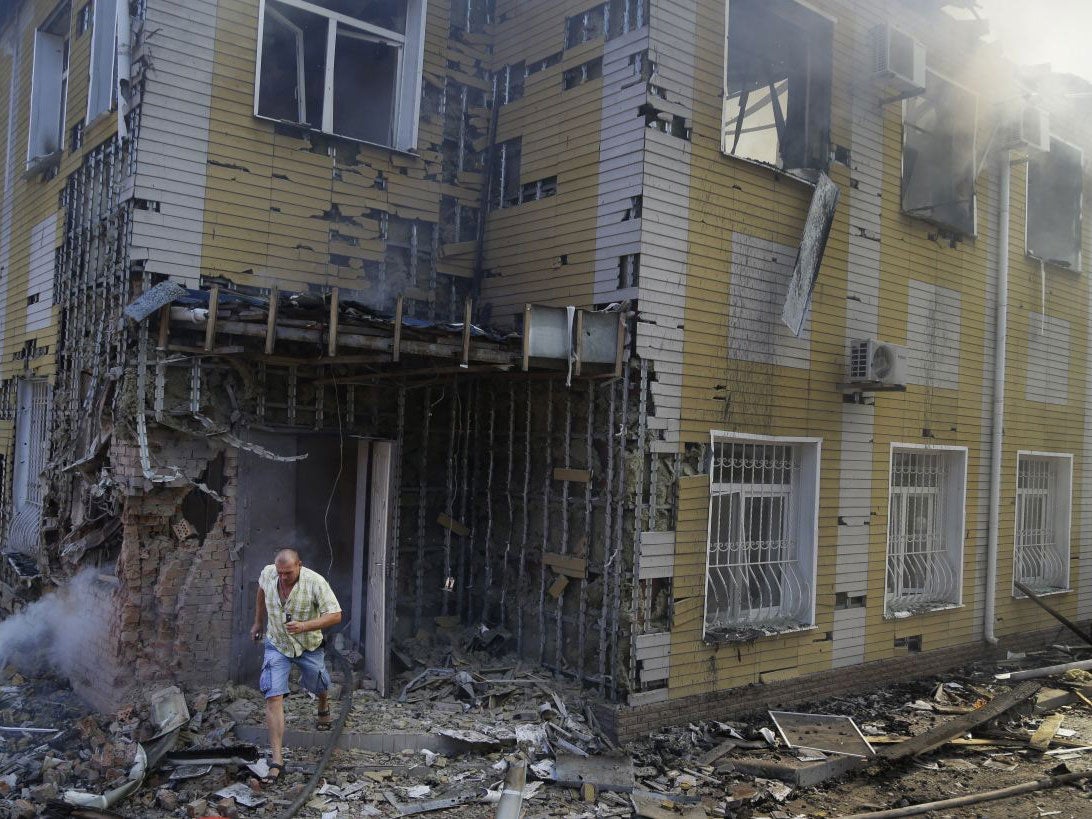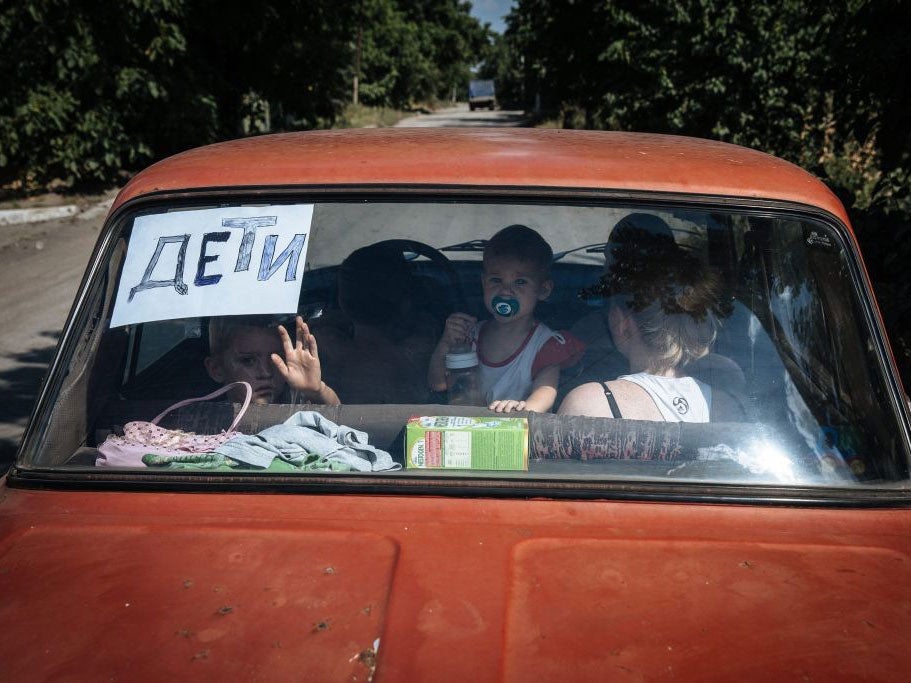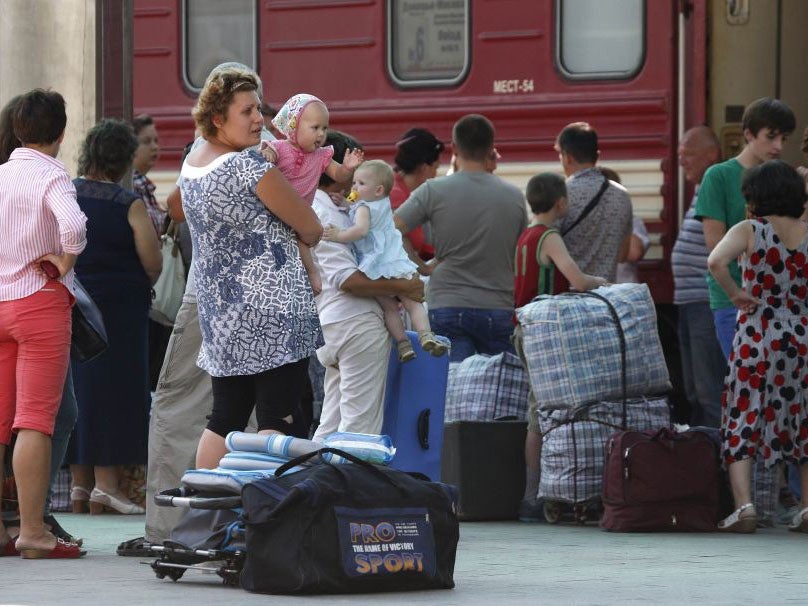Ukraine crisis: 100 prisoners escape from high-security jail hit by rocket as fighting rages in Donetsk
It was unclear whether the rocket was fired by government forces or rebels

Your support helps us to tell the story
As your White House correspondent, I ask the tough questions and seek the answers that matter.
Your support enables me to be in the room, pressing for transparency and accountability. Without your contributions, we wouldn't have the resources to challenge those in power.
Your donation makes it possible for us to keep doing this important work, keeping you informed every step of the way to the November election

Andrew Feinberg
White House Correspondent
More than 100 people have escaped from a high-security prison in eastern Ukraine after it was hit by a rocket that may have been fired by government forces.
The explosion killed at least one inmate in Donetsk prison, causing a riot that led to the escape of 106 inmates.
It was unclear whether the rocket was fired by the Ukrainian army and struck the jail by accident or whether it was targeted by rebels.
A spokesman for the city council said the fugitives included men jailed for murder, robbery and rape.
At least 10 homes, shops and garages were hit by bombing overnight by the Ukrainian military as the government attempted to regain control of the rebel stronghold.
Exchanges of rocket fire have become a daily feature of the fighting and an estimated 20,000 people are living without electricity.

Donetsk has been controlled by the self-styled Donetsk People’s Republic of pro-Russian separatists since April, when militants began occupying government buildings across Ukraine following the collapse of the Yanukovych administration.
The army has launched a major campaign to re-take control of the city from rebels and battles raged on Sunday, despite a request from the pro-Russian rebels for a cease-fire to prevent a “humanitarian catastrophe.”
Ukrainian officials demanded that the insurgents surrender instead.
More than 2,000 residential buildings had been damaged by shelling by Saturday and at least 300,000 of Donetsk's one million residents have fled.
The violence has claimed the lives of over 1,300 people since April, according to the UN, and one person was killed and 10 more injured in bombing on Sunday.

In a press conference in Kiev, Andriy Lysenko, a spokesman for Ukraine's National Security and Defence Council, said the only way for the rebels in Donetsk to save their lives would be to “lay down their arms and give up”.
"If white flags come up and they lay down their arms, nobody is going to shoot at them," he said.
"We have not seen any practical steps yet, just a statement."
Associated Press reporters heard 25 loud explosions in as many minutes around noon on Sunday.
More than 10 residential buildings, as well as a hospital and a shop, were heavily damaged by shelling on Saturday night and several buses caught in the crossfire were still burning on Sunday morning.

“This is a real war. It's impossible to live in this city, I've been sleeping in the basement for the past week,” said Inna Drobyshevskaya, a 48-year-old lawyer.
“We don't want Novorossiya (New Russia) for this price,” she added, referring to a term used by rebels to describe the parts of eastern Ukraine seeking independence from Kiev.
The Government met the request for a ceasefire with caution, claiming the move could be used to increase international pressure to allow a Russian aid mission to enter Ukraine, which they claim could be a pretext to bring in Russian soldiers.
An estimated 20,000 are reportedly massed near the border with Ukraine.
The Ukrainian President, Petro Poroshenko, has repeatedly accused Russia of providing arms and expertise to the rebels, which the Kremlin denies.
He issued a statement on Saturday saying his government was prepared to accept humanitarian assistance in eastern Ukraine.
But he said the aid must come in without military assistance, pass through border checkpoints under Ukrainian control and be an international mission.
The White House said President Barack Obama and the German Chancellor Angela Merkel agreed that any Russian intervention in Ukraine was unacceptable and would violate international law.
The US President spoke with David Cameron about the Ukraine crisis and the wars in Iraq and the Middle East on Saturday.
A statement from Downing Street said both leaders “expressed grave concern about reports that Russian military vehicles have crossed the border into Ukraine and that Russian armed forces are exercising for a 'humanitarian intervention’.
“The Prime Minister and President are absolutely clear that such a so-called humanitarian mission would be unjustified and illegal.”
Additional reporting by AP
Subscribe to Independent Premium to bookmark this article
Want to bookmark your favourite articles and stories to read or reference later? Start your Independent Premium subscription today.
Join our commenting forum
Join thought-provoking conversations, follow other Independent readers and see their replies
Comments